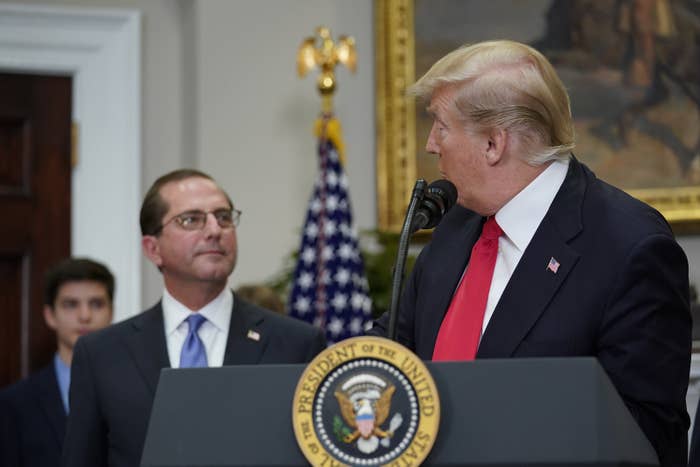
The Trump administration issued a funding guidance Friday afternoon for government-sponsored Teen Pregnancy Prevention Programs (TPPP) that favors specific, abstinence-oriented approaches.
This move is part of a large-scale overhaul of the congressionally mandated Obama-era grant program, which was created in an effort to move away from abstinence-until-marriage approaches to sexual education and teen pregnancy programs that were common under previous administrations.
Friday’s funding announcement compares the risk of teen sex to “drug use” or “failing to use a seatbelt,” and requires grantees to replicate one of two kinds of programs in order to receive funding: the first focusing on “sexual risk avoidance” and the second on “sexual risk reduction,” advocacy terms that favor abstinence-oriented approaches to sex ed.
When asked for comment on the new emphasis of the program, HHS referred BuzzFeed News to the announcement's fact sheet.
In August, Trump’s Department of Health and Human Services announced that it would end funding for all TPPP grantees two years before the grants were supposed to end, and would instead research “more effective” methods of teen pregnancy prevention, with an emphasis on “sexual delay.” This new funding announcement would continue the funding for those two years, but only if the organizations shift the focus of their programs.
The announcement comes days after a court ordered the Trump administration to continue funding three TPPP grantees through the end of their original grants. The Department of Justice indicated that it would appeal the order.
August’s announcement that HHS was ending the “current implementation” of the TPPP came along with a sudden cut to the full $213.6 million in funding to all 81 of the grantees (which served more than a million teens across the country), and the allocation of $10 million to research questions like, “Is it possible for youth who are currently engaged in risky behaviors to make healthier choices in the future?”
In the section of Friday’s guidelines outlining expectations for grantees, HHS placed an emphasis on “clearly communicating risk” of sexual activity. “The CDC considers teen sex to be a risk behavior, together with other risk behaviors, such as drug use, lack of physical activity, and failing to use a seatbelt when riding in a car,” the guidance reads.
It also outlined “9 elements essential for effective sexual risk avoidance,” including: “acknowledge and address common rationalizations for sexual activity,” “strengthen personal intention to avoid sexual activity,” and “identify and reduce the opportunities for sexual activity.”
The announcement gives grantees the option to focus on a “sexual risk reduction” approach, which puts less emphasis on the benefits of avoiding sexual behavior, and focuses more on targeting approaches specific to the group’s community.
However, this approach also suggests emphasis on “protective factors,” which says that “parental monitoring has been shown to protect against early sexual debut and other risky sexual behaviors,” and that “teens … have sex less frequently when they talk with their parents about sex.”
Abstinence-oriented education has been a priority of Trump’s HHS since Valerie Huber was named as acting deputy assistant secretary of the Office of Population Affairs. Huber was president and CEO of the abstinence advocacy group Ascend before joining the administration and was recently promoted to senior policy adviser to the assistant secretary of health.
In late March, Huber pushed abstinence education for international women’s health and equality programs at closed-door United Nations meetings, BuzzFeed News reported, and in February she was the architect of a revamping of Title X federal family planning programs.
The new Title X guidance did away with all the Obama-era requirements for grantees to provide all FDA-approved forms of birth control and instead emphasized “natural family planning methods,” funding opportunities for “faith-based organizations,” and organizations that promote “activities for adolescents that do not normalize sexual risk behaviors, but instead clearly communicate the research informed benefits of delaying sex or returning to a sexually risk-free status.” The only specific mention of a type of birth control is “natural family planning methods.”
Under the new guidance, prospective grantees have until June 29 to apply for new or continued grants.

